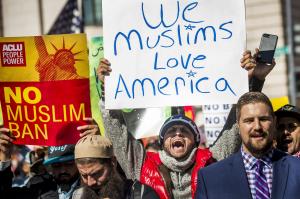April 25 (UPI) — The Supreme Court on Wednesday appeared to back the idea that President Donald Trump can unilaterally block U.S. entry for migrants of several largely Muslim countries.
On the first day of oral arguments on the issue, the high court appeared more sympathetic to Trump’s order than lower courts have been.
At issue is the third effort by Trump to pass the ban. The two prior versions were blocked in federal court.
If the court rules in the president’s favor, restrictions will be upheld banning travelers from Iran, Libya, Syria, Somalia and Yemen, on national security grounds. Chad was initially on the list, but was removed following security upgrades and cooperation with U.S. government, the administration said.
Wednesday, the court’s conservative justices said the order does not appear to mirror the “Muslim ban” Trump talked about during his campaign.
“If you look at what was done, it does not look … like a Muslim ban,” Justice Samuel Alito said, noting that the order applies only to about 8 percent of the world’s Muslims.
Liberal justices expressed concern about president’s power to ban travelers indefinitely.
“Where does the president get the authority to do more than Congress has already decided is adequate?” Justice Sonia Sotomayor said.
Trump has said the travel ban, which he called a “watered-down” version, is necessary to protect the country from terrorism.
Lower courts have three times ruled against the orders — the latest in February, when a federal appeals court said the ban is unlawful because it targets Muslims.
Parts of the travel ban have been allowed to take effect pending the Supreme Court’s ruling.
The latest version of the order also forbids entry for citizens of North Korea and Venezuela. Earlier this month, U.S. officials allowed Chad residents to again seek travel visas to the United States.
The state of Hawaii, the lead challenger in the case, argues the ban violates federal immigration law and the U.S. Constitution’s ban on the government favoring one religion over another. Other plaintiffs include individuals who argue they’ve been prevented from reuniting with relatives in the United States.
The plaintiffs say they have evidence of unconstitutional bias from Trump’s statements and tweets.
The Trump administration argues the proclamation is entirely based on national security concerns.
“President Trump has been steadfast in his commitment to the safety and security of all Americans,” U.S. Attorney General Jeff Sessions said earlier Wednesday. “The Constitution and Acts of Congress confer on the president broad discretion and authority to protect the United States from all foreign and domestic threats.”
The Supreme Court is expected to deliver a ruling in the case by the end of June.

COMMENTS
Please let us know if you're having issues with commenting.